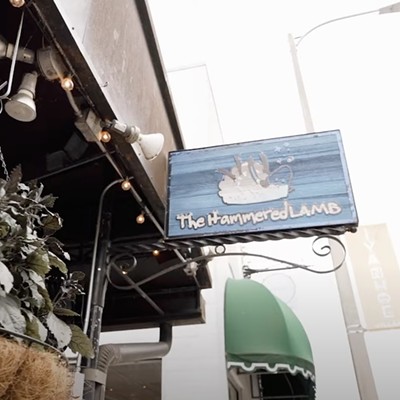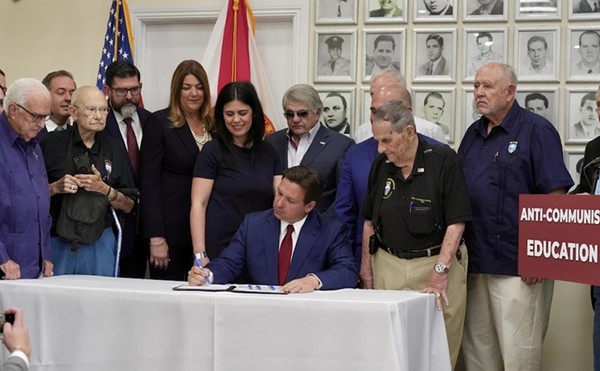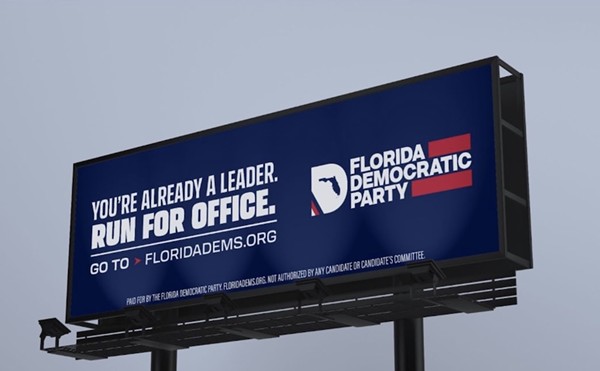Moments before Orlando mayor Glenda Hood uttered the words that will surely define her as a person, if not as a politician, she grabbed her throat in what many would recognize as the universal choking sign.
The issue at hand on Oct. 21 was whether commissioners should vote to add gays and lesbians to the class of people protected against discrimination by the city's civil-rights ordinance. This is the same ordinance that protects people of age and of color from housing and employment discrimination.
Four commissioners -- Ernest Page, Patty Sheehan, Daisy Lynum and Phil Diamond -- said they favored scheduling a vote. Two commissioners -- Vicki Vargo and Betty Wyman -- wanted to duck the controversial move, saying they'd rather put the issue before voters via a referendum.
Then it was Hood's turn. Rubbing her throat, subconsciously touching the gold necklace that hung there, Hood said she respected the other commissioners. She hoped everyone would be respectful of one another. The issue at hand was difficult, emotional, controversial, divisive, and she had looked at it from a personal, legal and community perspective. Balancing all those perspectives was difficult, she said.
Then she spoke the words that finally let Hood out of the closet, enabling gays and lesbians to know how she really felt about an issue they worked on for more than two years: "I haven't seen a demonstrative need to change the law," the 52-year-old Hood said. "That's where I am."
Forgive gay activists if they mistakenly thought Hood was somewhere else entirely. They had a lot of reasons to believe she could put aside her tendency toward small-town values. After all, it was only two years ago the mayor had quietly slipped a policy change past the council adding sexual orientation to the protected class of employees at City Hall.
There was hope on the sexual-orientation amendment as well. The mayor was supposedly delaying the vote to allow District 1 council member Phil Diamond to take office in June, replacing the more conservative Don Ammerman. Without Ammerman's dissent, the amendment would look like a slam dunk for the mayor; District 3 commissioner Vicki Vargo -- written off as clueless on the issue last spring -- would be the lone holdout.
"Eight months ago, Mayor Hood supported this," says Sam Odom. "She told another former elected official that she supported it but wanted a 6-1 vote."
At the same time, gays and lesbians weren't completely blindsided by Hood's opposition because they were aware of her limp-wristed stance on gay issues.
In one of the mayor's first appearances before a gay audience -- a meeting of the Metropolitan Business Association in 1993 -- she told the group she couldn't champion their cause, but encouraged homosexuals to get involved in city government and fight for their issues.
Five years later, in June 1998, gays and conservatives squared off over rainbow flags -- an international symbol of diversity -- flying on city-owned flagpoles. The council, which permitted the flags to fly, heard from the same folks (pro and con) now squaring off over the sexual-orientation amendment.
Yet Hood, somewhat idiotically, said at last week's council meeting that protecting gays and lesbians is a controversy, "the likes of which we've never dealt with in the city of Orlando."
Which means she probably doesn't recall approaching gay-rights activists with tears in her eyes after the rainbow-flag brouhaha. "She said at the flag hearings, Ã?I saw things I didn't know existed in this city. I am disgusted and ashamed,'" says Martha Chapman, an attorney and lesbian activist. "The hatred and vileness floored her. It made her feel awful for us to have to go through that on a daily basis."
By February 2000, the mayor was again suffering from a case of selective amnesia. At a meeting with the Metropolitan Business Association during which the group asked political candidates to endorse a nondiscrimination policy, Hood said there was no need for her support. Orlando was, in fact, a gay-friendly city, she said. "Her comment at the podium was that discrimination doesn't exist in Orlando because she had not heard about it," says Michael Slaymaker.
Gay activists can also cite an attempt by Hood's administration to derail the sexual-orientation amendment before it came to council.
The amendment was first heard by the five-member, volunteer Human Relations Board. According to City Hall sources, Hood hoped that board would be too conservative to pass the measure.
Just to make sure, though, the mayor sent her assistant, Wilbur Gary, to a board meeting last September to advise members they could not hear the issue. The city would amend its ordinance if and when the federal government did, Gary told them.
But Hernan Castro, an attorney who's been on the board two years, recommended that they pursue the issue, saying sexual orientation is exactly the kind of issue the board was set up to review.
Despite the Gary roadblock, gays and lesbians were certain the mayor would not only schedule a vote on the sexual-orientation amendment, but in fact endorse the measure.
"Everybody's thinking that was going to happen," says Debbie Simmons, a Colonialtown businesswoman and lesbian activist. "The thinking was that it would ward off some of these fanatical legal challenges."
But Hood apparently caved to pressure from the religious right because she's seeking a gubernatorial appointment should Jeb Bush win re-election. One rumor around City Hall is that she wants the secretary of state's job, vacated by the infamous Katherine Harris, who's running for Congress. (How queer would that be, a secretary of state who doesn't want to schedule elections because they're "too divisive"?)
Bush, according to District 4 commissioner Patty Sheehan, is a "friggin homophobe." He doesn't meet with gay groups in Tallahassee, she says, and opposes lifting the state's ban on gay adoption.
By allying with Bush, Hood puts herself in a bind. She wants to be remembered as a visionary leader, one who will be revered by progressive groups like the Faces of Florida and the National League of Cities, both of which she belongs to. But she also is ambitious enough to place a hot-button issue like sexual orientation on hold until she finds a more comfortable office somewhere else.
"She's got a huge PR problem," Sheehan says. "She wants to be known as a kinder, gentler mayor. She wants to be known as a person supportive of diversity, but how can she be a person supportive of diversity when she's opposed to protections of diverse people?"
Hood has scheduled the first hearing on the sexual-orientation issue for Nov. 18, followed by another hearing Dec. 3. Should they lose the first round, gays and lesbians could turn to more extreme measures. There's talk of an economic boycott, which might have a profound affect on the tourism industry, especially the $100 million spent during the week-long Gay Days in the first week of June.
But Chris Alexander-Manley, Gay Days' vice president of marketing, says a boycott would be a mistake. He advocates a "buycott," targeting gay-friendly businesses for increased financial support from the gay community.
And, of course, Alexander-Manley advocates hauling the "Glenda's gotta go" signs out of the garage, taking it to Hood and other antigay politicians during election time (should, God forbid, Hood decide to run again). "We should try to find candidates who believe in equality," he says.


















